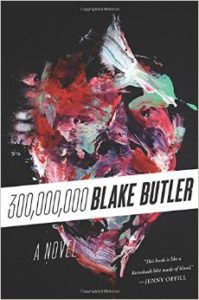Blake Butler gives a reading and lessons on innovation in writing
Written by Emme Raus, copy editor, and Tonesa Jones, staff writer

Author and blogger Blake Butler read from his new book “Three Hundred Million: A Novel” at Ivy Hall at 6:30 p.m. last Thursday. Butler is the author of five books of fiction including “Ever” and “Scorch Atlas” as well as a memoir titled “Nothing: A Portrait of Insomnia.” In addition, Butler was the editor of the former literary blog HTMLGIANT.
The young author was introduced by literary professor James Iredell who described Butler’s work as “language-driven, surreal stories.”
“Three Hundred Million: A Novel” was printed by HarperCollins Publishers and released late last year. In the novel, 300 million Americans die from a psychically-transferred disease which drives people to murder other people. This work of fiction is divided into five parts and follows three characters: mass-murderer Gretch Gravey and his cult followers, the troubled detective trying to track Gravey down and a god-like entity named Darrel who is allied with Gravey.
The dark tone of the novel is trademark Butler relying more on the craft and musicality of language rather than establishing a traditional narrative. Each passage Butler emphatically read from was laced with meticulously structured sentences that created haunting imagery.
After the reading, Butler answered questions from the audience. Butler stated that his editor, upon reading “Three Hundred Million: A Novel,” sent him a 70-page word document with feedback. The author praised him for “connecting dots that I didn’t even see.”
When asked about the lack of dialogue in the work, Butler said “I really hate dialogue. Dialogue is my Achilles heel.”
Finally, Butler emphasized the power of small presses saying “most of the really edgy stuff in America comes from small presses.”
Prior to his reading, Butler sat down with Professor James Iredell’s graduate nonfiction class and provided his perspective on freelance writing and his approach to writing nonfiction. These are some of his tips:
1. “It’s ok to approach things in a fragmentary way as opposed to a dictionary.” Fragmentation and poetic elements of writing can transform subject matter from the familiar to a transcendental experience.
2. “Even when [writing about] the most cut and dry [subject] , someone’s personality is influencing it.” An awareness of your voice as a freelance writer can greatly shape the content you produce.
3. “Errors that are used correctly and with intent can be more powerful than following the rules, you have to know why you’re doing it.” Occasionally rejecting conventions can lead to profound moments in writing.
4. “Be open to anything.”As a freelance writer, you must push yourself beyond your idea of a niche and be open to writing about a diversity of topics from music to baby ailments.
5. “Protect your time.” One of the most important things writers need is time to write. Carve it out of your day and guard it.




















